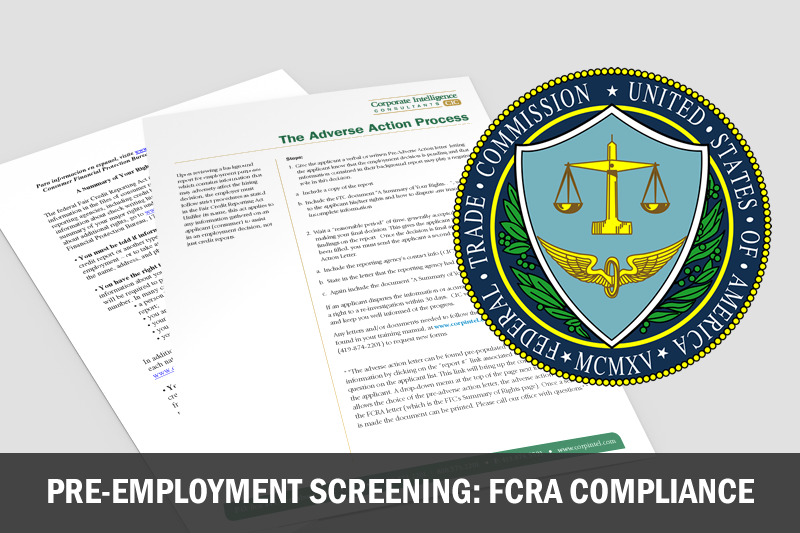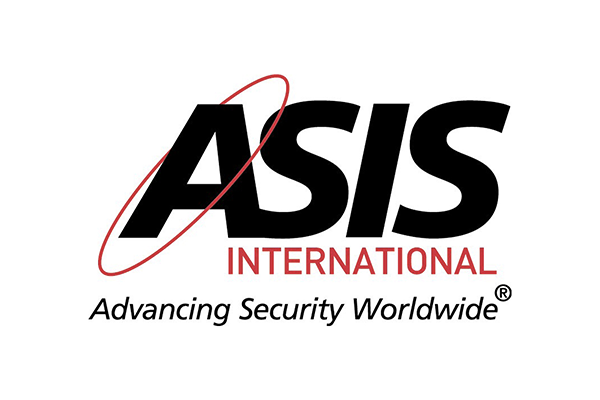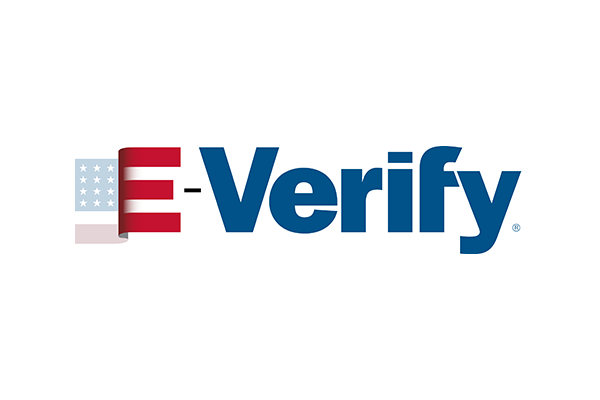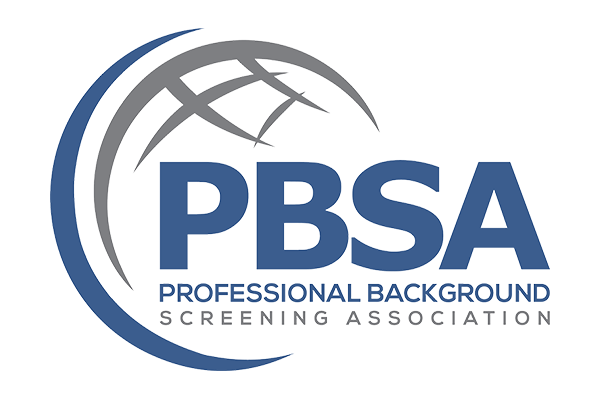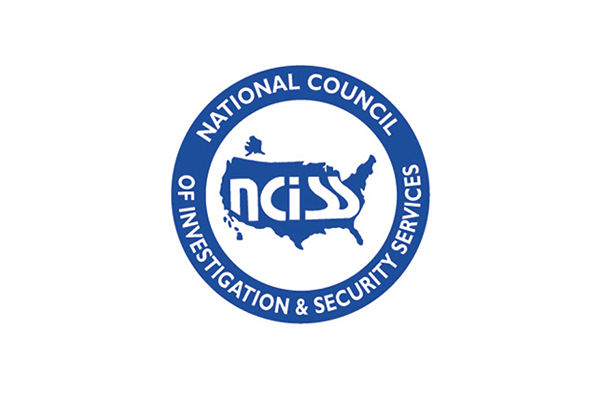In the legal update at the February FAHRA meeting, Eastman & Smith, Ltd. Labor and Employment Attorney, Heidi Hartman, brought to our attention recent lawsuits citing violation of the FCRA - specifically, the Adverse Action Process.
This process is required by the FCRA when you are using a Consumer Reporting Agency (CRA) to do your background checks. CIC is acting as a CRA when we perform the pre-employment background checks requested by our clients. In light of these recent lawsuits brought against an employer and the background screening company they use, I think it is time for a review the Adverse Action Process. Heidi has kindly agreed to provide her legal insight to this process.
The Process
If, upon review, a pre-employment background report contains information that may adversely affect the hiring decision, the employer must follow strict procedures as stated in the Fair Credit Reporting Act (FCRA). Unlike its name, this act applies to any information reported in a background check, not just a credit history reports.
The steps that must be followed in the Adverse Action Process are:
Step 1 – Pre-Adverse Action
Give the applicant the Pre-Adverse Action letter (in person, mailed or emailed) letting the applicant know that the employment decision is pending and that information contained in their background report may play a negative role in their decision. You must make sure that the applicant knows who to contact if they wish to dispute any of the information in the report. In addition, there are 2 documents that must be given to the applicant along with the letter:
- a. Include a copy of the completed report
- b. Include the FCRA document “A Summary of Your Rights…”, which explains the applicant’s rights and how to dispute any inaccurate or incomplete information
The employer must wait “a reasonable period” of time, generally 5-7 business days, before sending out the second letter. This will allow the applicant time to contact the CRA if there is information on the report that they wish to dispute or explain. If the applicant initiates a dispute, our procedure is to contact the employer to let them know that there is a dispute in progress. We will then re-investigate the disputed information and, if necessary, make changes to the report. The employer can either wait until there has been a re-investigation or fill the position with another applicant.
If, upon completion, the re-investigation requires amending the report, both the employer and the candidate will be given a copy. If, after reviewing any changes to the final report, the employer’s final decision is not to hire, the employer must send the 2nd letter – the Adverse Action letter.
Step 2 – Adverse Action
If the candidate does not dispute the original report or if, after reviewing an amended report, the employer intends not to hire the candidate, the second notice or Adverse Action letter must be sent to the candidate. Be sure to include the following:
- a. The reporting agency’s contact info (CIC)
- b. A statement in the letter that the reporting agency had no part in the actual employment decision
- c. A copy of the report
- d. The FCRA document "A Summary of Your Rights..."
According to Heidi Hartman:
Employers who do not regularly review their background screening process compliance practices can find themselves in legal hot water. Lawsuits under the FCRA are not as common as those under Title VII, the ADAAA or FMLA, but they can be just as costly to litigate as those other claims. A case recently decided in United States Federal Court for the Northern District of Ohio, Cox v. Teletech@Home, Inc., provides a good cautionary tale for employers and is a good example of why employers should periodically review and confirm their FCRA compliance practices.
Mr. Cox applied for a position with Teletech@Home, Inc. and received a conditional job offer, contingent upon passing pre-employment screening, including a criminal background check. The employer used a third party consumer reporting agency (CRA) to perform background checks, and as part of the service provided by the CRA, the CRA sent the required notices to prospective employees on behalf of the employer using employer letterhead.
However, the employer also independently incorporated another step in its pre-hire process that potentially ran it afoul of the FCRA. Here, the employer generated a separate notice that it sent to hundreds of prospective employees over the years whose background checks were subject to challenge and/or correction. Mr. Cox received this notice from the employer’s Talent Acquisition Department by e-mail one week after he received the conditional job offer. The e-mail, which included a subject line stating: “Urgent/Rescinded Job Offer,” read as follows:
After successfully completing the interview process we extended to you an offer of employment. In your offer call we advised you of the pre-employment items that needed to be successfully completed in order to continue in the hiring process. Your offer is contingent on all pre-employment items being completed successfully and within the required time frames.As Carolyn advised in her summary above, under the FCRA, a job offer cannot be rescinded until a pre-adverse action letter is issued along with a copy of the completed report and the FCRA "Summary of Your Rights." In this case, Mr. Cox did not receive the pre-adverse action letter by e-mail from the CRA until two days after receiving the above e-mail directly from the employer. Neither the employer’s e-mail nor the e-mail from the CRA included the information from the criminal report. Days later, Mr. Cox received the paper copy of the Pre-Adverse Action notice, along with the consumer report and the summary of FCRA rights. Mr. Cox, who was aware from prior experience that he had the same name as a convicted felon from Alaska, completed and returned the paperwork to correct the information.
One or more items of your pre-employment screening were either not completed in the time required and the results of the pre-employment screening make you ineligible for hire at this time.
If your removal is due to a failed drug screen you will be contacted by the Medical Review Officer for the lab where you were tested. If there was a finding on your criminal background screening that makes you ineligible for hire with TeleTech, you will receive a notification from our third party vendor as well as an explanation of your rights in regards to this decision.
Unfortunately at this time we are rescinding your offer of employment. Please do not attend or attempt to attend class as you are no longer eligible for this position. If you believe you have received this message in error, please contact us at [ ... ] through our live chat feature. We’d be delighted to research your situation and provide any necessary guidance.
We would like to thank you for your interest in TeleTech@Home and wish you the best of luck in your career search.
The employer said that it never actually rescinded its offer, and that Mr. Cox' application was merely on hold pending resolution of the challenge. In fact, the employer contacted Mr. Cox after receiving the corrected information and advised that the application was no longer on hold and asked him to attend training. However, the employer later decided Mr. Cox should not attend because he hadn’t submitted the required I-9 form.
Mr. Cox sued the employer, alleging that it willfully violated the FCRA by failing to provide a copy of the consumer report and summary of his rights before rescinding the job offer. The Court denied summary judgment to the employer, holding that a jury could find that the "Urgent/Rescinded Job Offer" e-mail sent by the employer communicated the adverse action decision in violation of the FCRA.
The employer claimed that it did not know that the form e-mail existed or that it was sent to hundreds of applicants. The Court found that because the employer did not have an apparently effective systematic policy or procedure to ensure compliance (despite the fact that it trained its employees and they were aware of the FCRA’s requirements), it could be found to have willfully violated FCRA. Willful violations subject employers to either actual damages or statutory damages, and possibly punitive damages. In order to avoid facing similar complaints, employers should be aware of the FCRA’s requirements and should periodically review practices to make sure employment decision are not communicated without complying with the adverse action process of the FCRA.
CIC’s automated Adverse Action service is part of our screening software. This makes it easy for our clients to generate the Pre-Adverse and Adverse Action letters and the required accompanying documents directly at the website. The letters are standard, compliant notices. However, they can be edited in the system by the client. Our clients can also set a reminder within the system to follow the Pre-Adverse letter with the Adverse letter.
Clients who prefer not be to directly responsible for sending the Pre-Adverse and Adverse Action letters may order the letters directly from CIC’s web portal. CIC will process the order, mail the letters with the accompanying documents, and notify the client when each letter has been sent. Whether clients choose to send their own letters or to have CIC send them on their behalf, they can ensure compliance with the Adverse Action process via CIC’s secure screening portal.
Many thanks to Heidi Hartman for her contribution to this newsletter. Her summary of the case and valuable commentary help illustrate the importance of having a compliant process and following procedure when taking Adverse Action. If you have questions for Heidi, she can be reached at 419.241.6000 or go to Eastman & Smith’s website for additional articles as well as a listing of their upcoming events: https://www.eastmansmith.com.
For more information about this article, please contact us at 1.800.573.2201 / 419.874.2201.

